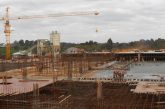
Construction of Kenya’s Sh 39billion oil terminal nears completion. The Kenya Ports Authority confirmed the report and said the project is 80% complete and will be ready by December.
The new and modern oil facility is being developed at the Mombasa port and is aimed at cutting fuel prices. It is designed to have five onshore pipelines, each dedicated to a separate oil product to existing Kenya Petroleum Refineries Limited (KPRL) and Kenya Pipeline Company tanks in Mombasa.
Upon completion, it will handle vessels of up to 170,000-deadweight tonnage compared to one ship of 110,000 deadweight tonnage on the existing oil terminal, improving on capacity and efficiency on handling fuel products include LPG, crude oil or heavy fuel, aviation fuel, diesel and petrol. The project is fully financed by KPA.
Construction of the project which commenced in 2019 faced delays due to the Covid-19 pandemic. It was supposed to have been completed by October. According to KPA acting managing director Rashid Salim, Delivery of material used in the construction was affected and the site was closed for several weeks when the pandemic struck.
Demurrage charges
The country has for decades depended on the old Kipevu Oil Terminal and the Shimanzi terminal near the Likoni Ferry channel to offload oil products. The two can only handle one oil tanker at a time. According to the Energy and Petroleum Regulatory Authority (EPRA), the new facility will do away with demurrage charges currently imposed as a result of delays on oil tankers.
Demurrage is a charge payable to the owner of a chartered ship on failure to load or discharge the ship within the agreed time. With speedy cargo evacuation, the country will save on demurrage costs to the tune of Sh0.50 per litre per month for each of the three price regulated petroleum products, according to EPRA.
“There will be no any demurrage or standby charges that we normally have when ships have to wait before being handled. The cost is passed on to consumers affecting fuel prices. We expect this to end. The country will also enjoy economies of scale from use of bigger vessels,” said Salim.
EPRA is also banking on increased fuel storage capacity by both the government and the private sector to accommodate more products, for longer periods, a move that will help manage prices based on international crude prices.





